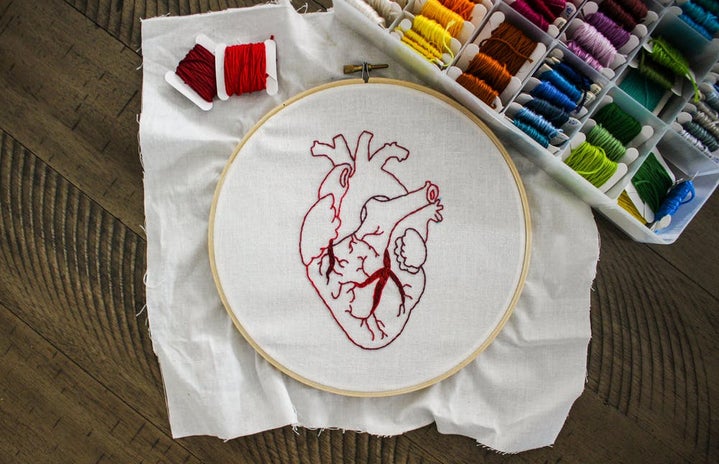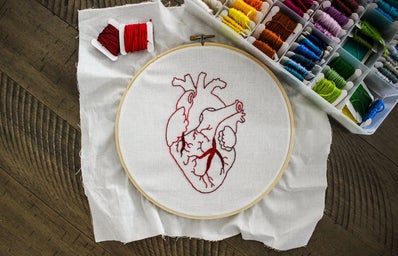Valentine’s Day is usually surrounded by love. Around this time, many single people tend to say, “I’m single, Valentine’s Day isn’t for me.” Dr. Lindsay Bira, Clinical Health Psychologist, a Tedx Speaker and an Adjunct Professor of Psychiatry at the University of Texas Health is here to say: that’s okay. I had the pleasure of speaking with Dr. Bira and learning her insight on the brain behind the heart, helping people be smarter than their brains, and allowing them to be happier, healthier and more successful in their lives.
Her Campus (HC): Hi, Dr. Bira! What are three necessities of a healthy relationship?
Dr. Lindsay Bira (DLB): One of the most important decisions anybody could make in life is who they partner with. We know through research that your partner relates significantly to your long-term health, whether that be mental, physical or financial. Picking a long-term mate is one of the most important things we can do. Let’s discuss the 3 Cs:
Communication: Relationships are hard and life is crazy. Communication really reduces conflict over time. We can communicate positive things, like how much we care about and love somebody, which builds trust; we can also communicate negative moods and our problems so that we can stay bonded.
Compassion: In a relationship, we have two separate beings with two different life experiences which shape the ways that we view the world. Compassion for somebody else’s needs helps us be on the same page, even through hard times.
Chemistry: You have to feel naturally connected and attracted to your partner in ways that help you bond. Cuddling, hand-holding and eye contact are things that come naturally when you do feel natural chemistry. This is not something that we can force. Data shows that on a very chemical level, we pick partners who have opposite immune profiles as us because it gives offspring the chance of having the best immune variation.
HC: What is an underrated aspect of a happy relationship?
DLB: Another C: conflict resolution. Daniel Gottman, the number one researcher in couples therapy, observed couples when they talked about something they disagreed on. He was able to predict with 97-percent accuracy if that couple was going to be divorced or broken up within the next two years just by how they talked about a difficult subject. He calls this the four horsemen of relationship failure: criticism, defensiveness, contempt and stonewalling.
It all boils down to being able to resolve conflict in healthy ways pretty immediately; trying to repair it as soon as you feel your partner pull away. You will have conflict, but if you and your partner have good habits to resolve quickly, you’ll stay connected and will ride the crazy waves of life together.
HC: What is one fictional relationship that is accurately depicted?
DLB: Movies and TV depict relationships that do not show all the complexities of a real relationship. Can any movie really do that in only two hours? No. I think the lesson here is that with love, let’s practice not finding the roadmap through the movies but through living a real life, developing yourself and trusting your gut.
HC: Why do you believe it is important to have self-love before being able to give love to others?
DLB: Part of the human condition is to not be satisfied with ourselves, to be critical. Self-love is a work in progress. You don’t have to possess a lot of self-love to be in a relationship. That being said, it is important to consistently work on having a stable sense of self-love so that you have a strong sense of identity and not be passive so you can set boundaries with your partner.
Make sure you have multiple groups of friends for multiple reasons, make sure you maintain healthy relationships with family as much as possible and make sure that you have long-term goals that are unique to you.
HC: What is a sign that you are not ready to give love to someone else or be in a relationship?
DLB: If you know who you are, if you know what to do on a daily basis, if you have plans, things you’re passionate about, and something that you’re doing only for yourself to allow yourself to move forward and grow: you’re ready. Where we walk into trouble is when we’re making decisions that are totally for other people. If you don’t have anything else going on in your life then when you meet somebody, your whole life may be about them; these people significantly struggle after the relationship.
Take a pulse check on if you feel balanced and if you feel like you have multiple things in your life that are yours that allow you to enter different situations with a strong sense of self.
We do not have to be whole or fully love ourselves to begin a relationship. You can find a healthy relationship and develop these things about yourself as you grow together, as long as it is healthy.
HC: Do you have any tips on finding the best match for our readers?
DLB: Bottom line: it’s a numbers game. The more lines you throw out there, the more likely you will be to catch a fish. This means the more time you spend out in public, where you are engaging with other people, with open body language, maintaining eye contact, having a pleasant smile on your face and exhibiting happiness, the higher your chances are you will meet somebody.
It takes a lot of work and a lot of swipes to actually have a date. I would encourage you to not get offended if someone doesn’t write back, because usually, that means they’ve started dating someone else, they’re busy or they aren’t on the apps. It is okay. I would ask for a date very quickly because the only way to determine real chemistry is to meet up with them in person.
Trust your gut. Ask the question, “How do I feel about this person, how does this person make me feel? Do I feel calm, curious and safe with this person, or do I always feel like I am walking on eggshells, never knowing what to say and feeling extremely insecure?” That may mean that the other person is not good at creating a healthy attachment so we just want to wean that out and see what happens.
There’s a lot of relationship talk during Valentine’s Day, and I just want to take a second to say that it is totally normal to be single. By being single, you are actually saving yourself from extreme relationship turmoil. By being picky and choosing the right partner, you’re developing yourself for many years before you choose to take that step with somebody who you think is important enough.
If you are single on Valentine’s Day, do not ever feel down about that. Know that you are prioritizing yourself and your life and you are maximizing the chances to have successful, healthy long-term relationships by being intentional about it and by developing yourself.
Every Valentine’s Day, make a gesture of self-love that honors everything that you’ve worked for that makes you feel love and like you’re taking care of yourself.
Dr. Lindsay Bira is a clinical health psychologist, TEDx speaker and adjunct medical professor who specializes in trauma, stress, wellness and resiliency. Through 1:1 sessions and speaking to groups, Dr. Bira provides research-based information & tools that foster growth, performance and meaning. Her research and work has been featured in Nature Biotech, Science, Women’s Health Magazine, NPR, Headspace, local news TV and more. Dr. Bira is based in Miami and serves clients across the globe, believing that once a person has the right support and tools, any personal or professional endeavor is achievable and wellbeing is maximized. See more at www.DrLindsayBira.com or follow her Instagram (@DrLindsayBira) for daily tips.
Want to see more HCFSU? Be sure to like us on Facebook and follow us on Instagram, Twitter, TikTok, YouTube and Pinterest!


